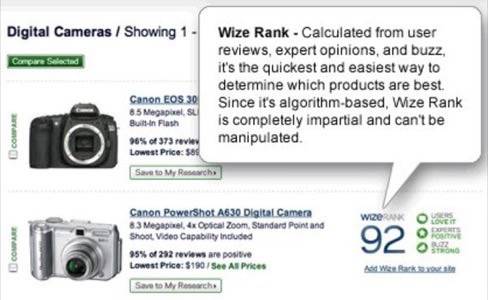Following my
analysis of TheFind, a lifestyle shopping service, in this post I will explore Wize – product research engine. Note that I have also
reviewed the business story of Wize on my
personal blog. So now let’s take a look at their actual product using my Web 3.0 framework.

Context
The Context in which you would come to Wize is Product Research. The key to Wize is
the Wize Rank, which is algorithmically derived from Expert Reviews and User Reviews,
culled from all over the web.

If you drill one level down, however, there is not enough expectation setting at the
sub category level. For example, on competitor Become.com Belgian Chocolates with Orange Peels is
advertised right at the top in a somewhat seductive way. It drew my attention straight
away. But when I tried the same search on Wize, it returned zero results.
What that means is that Wize is stronger in some categories than others. This is
normal. But they need to do a much better job of setting the user’s expectations. For
example, TheFind,
which we reviewed earlier, focuses on LifeStyle shopping and bypasses the
Electronics, Computers and Gadgets categories – more or less. So Wize needs to also align
its segmentation strategy, and decide where it is strongest. To be entirely accurate, TheFind also doesn’t set these expectations well.
Commerce
Commerce, in my opinion, is one of the biggest problems with Wize. I did a search on a
17″ Flat Panel LCD Monitor. I found reviews, along with price tags in the $170 range. I
bought the monitor for $80 on eBAY. I did not like the experience of not being able to do
the product research alongside a compelling price comparison capability. I also did not
like the fragmented user experience of doing the functionality research in one place, the
price comparison shopping at another, and the actual transaction in a third place.
I am trying to move my web experience to as much of an integrated user experience as
possible. I don’t want to expend 50 clicks for something that should be done in 5. Wize
has a long way to go towards creating this integrated commerce experience.
Community
Wize’s whole premise is based on accumulating the Community’s opinion from all corners
of the web, which is quite powerful and useful. It, however, doesn’t really engage the
community on its site per se. But I don’t have a huge problem with this approach.
Content
The juxtaposition of User Content and Expert Content is good. Often, when we research
products, we need a fairly detailed feature function that does not come from reviews, but
rather, comes directly from manufacturers and retailers. These “Specs” are also available
on the Wize site, nice and cleanly organized.
I like the “Wize Rating”, “Buzz Monitor”, and “Users Love/Like/Hate It” features as
quick, high level metrics from which to narrow down the choices.
I would say then that Content is a strong suit for the company.
Vertical Search
This gets us back to our earlier discussion on Context, and Context-specific Search is
precisely where the opportunity lies here. Wize does a great job searching for pieces of
content that are Product Reviews of various kinds (User, Expert) – which is one dimension
of vertical search.
Beyond that, in certain categories, they also do an excellent job in identifying the
key vectors along which users search for items. An example is a Digital Camera, which can
be searched for by Price, Resolution, Brand, Camera Type, Optical Zoom, etc.
But this capability, as you broaden out of their core competency verticals, starts to
fade – which is precisely why expectation setting is quite important. I tend to set
expectations via Positioning and Messaging.

Personalization
Personalization exists in the ability to save research in a personal space. Not much
beyond that rather simplistic capability. What about capturing preferences? If I have
already purchased a Canon Powershot 8.3 Megapixel camera, perhaps storing and using that
information for future sessions would be very useful. Then, you can show me accessories
that are compatible with what I already own.
Competition
Even though the company identifies Become and ConsumerSearch as its chief competition, I would
say it also competes with TheFind and other shopping engines to an extent – simply
because, in the consumer’s mind, the Context is “Shopping”.
Become, in fact, does what I have recommended Wize to do: provide an integrated shopping experience,
with research and shopping combined in one place.
Nonetheless, for a young company, Wize shows promise, and I will give them the
following Web 3.0 scores: Context: B-,
Commerce: C, Content: A, Community: A-, Vertical Search: A-, and Personalization: B-.
Related: Read the business story here.

















